Statement: Orbán’s threat to ban LGBTI Pride marks a dangerous step toward silencing dissent
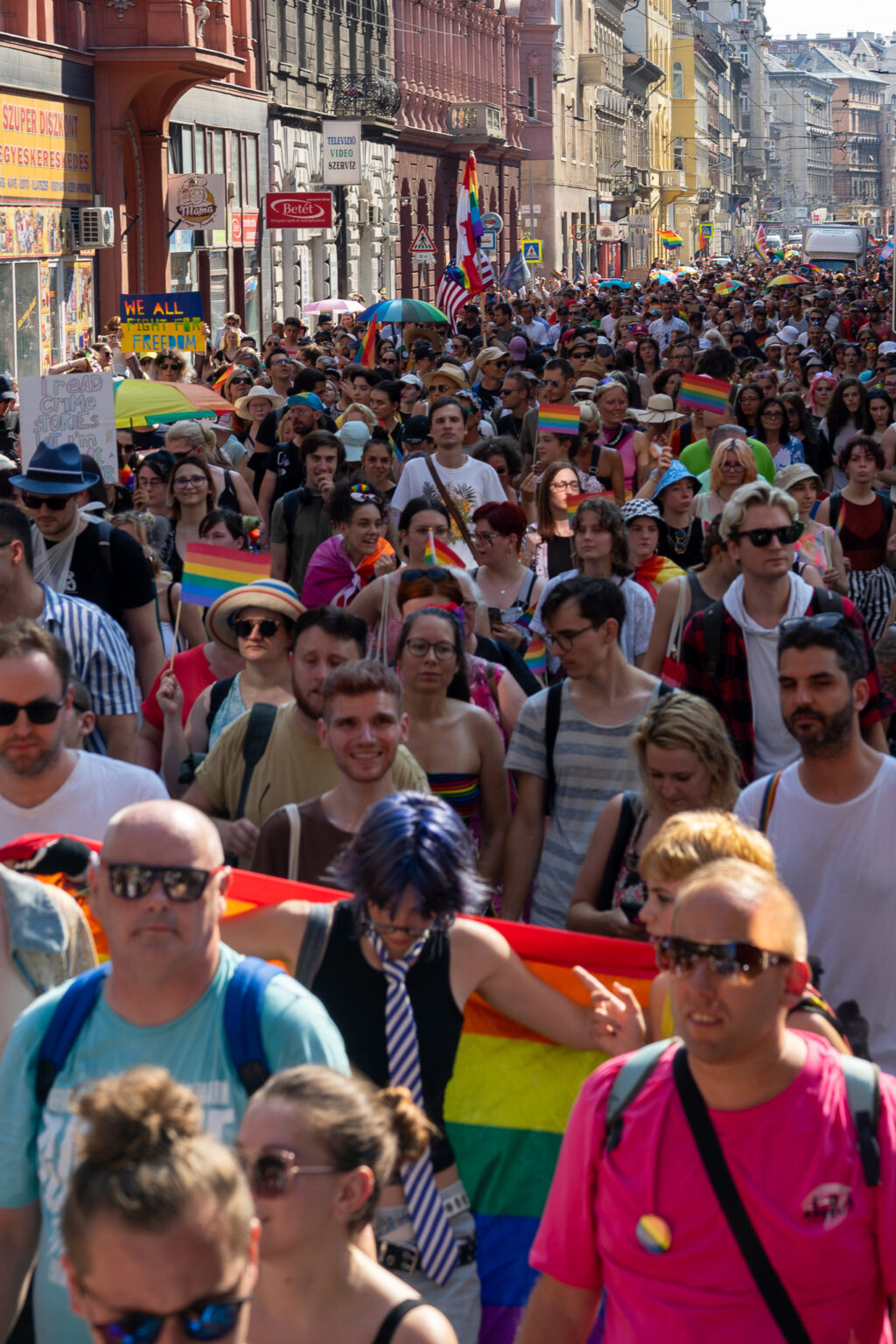
Hungarian Prime Minister Viktor Orbán’s threat to ban the 2025 Budapest Pride march has sparked outrage, with concerns over restrictions linked to the country’s anti-LGBTI law. ILGA-Europe stand in solidarity with the organisers of Budapest Pride, and assert the Hungarian people’s right to peaceful protest.
On 22 February, the Hungarian Prime Minister, Viktor Orbán, delivered a speech in which he threatened to ban Budapest Pride. During his State of the Nation address, Orbán said: “I advise the Pride organisers that they should not bother preparing for this year’s march. It would be a waste of time and money”.
While no legislation has yet been tabled to outright ban the 2025 Pride march, the government has referred to restrictions on its location, justifying this on the basis of the Hungarian anti-LGBTI law adopted in 2021, which bans promotion or portrayal of so-called “divergence from self-identity corresponding to sex at birth, sex change or homosexuality” to minors. This effectively bans depictions or “promotion” of LGBTI identities in the public space or anywhere where minors could be present or see LGBTI related content.
The European Commission has taken Hungary to court over this aforementioned law, and any restrictions or bans on Pride would also contravene laws related to freedom of assembly and freedom of expression, protected in both international law1 and Hungary’s own Constitution2.
Last year, 35,000 people marched, making Budapest Pride the largest recurring civil rights demonstration in the country. Activists anticipate that this year’s march will be Hungary’s largest Pride ever. Many Hungarians who have never attended any Pride marches are publicly declaring their intention to join because the government is threatening a ban.
Banning Pride in Budapest would eliminate a crucial platform for Hungarians to demand that their government listen to its people and uphold democratic values. It would mark a dangerous step toward restricting the right to protest and silencing dissent.
We affirm the value and importance of Pride as a peaceful gathering to assert the equal human rights of LGBTI people, in the context of demanding equal human rights for all. We decry any attempt to stamp out Pride as an attack on everyone’s right to freedom of assembly. We stand in solidarity with Budapest Pride, who will march on June 28, and are determined to fight all obstacles laid in front of them. We urge the authorities in Hungary and every democratic state to respect and protect the right to peaceful assembly. A society that upholds human rights for all is a stronger, more just society for everyone.
ILGA-Europe Statement: Turkey is detaining LGBTI+ activists and journalists, and targeting basic rights

The Turkish government has intensified its repression of LGBTI+ human rights defenders, detaining activists and introducing draconian laws that further restrict legal gender recognition, trans healthcare, and free expression. The proposed measures mirror anti-LGBTI+ laws in Russia and Hungary, prompting urgent calls for action.
The last two weeks have seen an increasingly severe crackdown on LGBTI+ human rights defenders and activists in Turkey. This comes during a time when the Turkish government is eroding civic rights and freedoms, including detaining journalists, opposition politicians, and targeting civil society organisations (CSOs) through smear campaigns and further restrictive legislation.
On 18 February, journalist and Editor-in-Chief of KaosGL.org, a news portal dedicated to LGBTI+ issues, Yıldız Tar, was arrested and accused of “membership in a terrorist organisation”. They were arrested alongside a number of journalists, activists (including Erkin – a trans activist), artists and opposition MPs, amounting to 52 arrests that day.
The following week, on 27 February, draft amendments of the Turkish government were leaked to the press which aim to amend the Criminal and Civil Codes to further restrict access to legal gender recognition and trans-specific healthcare, ad criminal sanctions to these as well as criminal sanctions for “any person who publicly encourages, praises or promotes attitudes and behaviors contrary to innate biological sex and public morality” and “persons of the same sex [who] perform an engagement or marriage ceremony”.
The further restrictions to accessing legal gender recognition are:
- Increasing the age of eligibility from 18 to 21.
- Reintroducing mandatory sterilisation (a provision previously annulled by the Constitutional Court and found to violate the European Convention of Human Rights by the European Court of Human Rights (ECtHR)).
- Introducing a lengthier process for approval, requiring an official medical board report to be issued by a “full-fledged training and research hospital designated by the Ministry of Health as a result of four evaluations to be made at least three months apart” (previously it was to be obtained from a training and research hospital), with no maximum duration set, potentially allowing indefinite delays.
Additionally, a new requirement for accessing trans-specific healthcare is introduced, stipulating that it can only be carried out after permission is obtained from one of the above-described hospitals designated by the Ministry of Health.
The criminal sanctions being introduced include sentences of:
- 3-7 years imprisonment and a judicial fine from 1,000-10,000 days for anyone who commits gender reassignment surgery contrary to the new provisions, with the recipient of the surgery facing 1-3 years imprisonment.
- 1-3 years imprisonment for “Any person who publicly encourages, praises or promotes attitudes and behaviors contrary to innate biological sex and public morality”.
- 1.5-4 years imprisonment for “persons of the same sex [who] perform an engagement or marriage ceremony”.
These new legislative restrictions will further restrict the already inaccessible process of legal gender recognition and access to trans-specific healthcare in Turkey (see our previous statement regarding this), making legal and medical transition nearly impossible.
The requirement for mandatory sterilisation and medical certification in order to access legal gender recognition has already been deemed abusive by international human rights bodies. ECtHR case law is clear that such requirements are in violation of the right to privacy and the right to bodily integrity. The Parliamentary Assembly of the Council of Europe (PACE) has called on its member states to “develop quick, transparent and accessible procedures, based on self-determination”. The UN Independent Expert on Protection Against Violence and Discrimination Based on Sexual Orientation and Gender Identity has also recommended that legal gender recognition should be based on self-determination, be a simple administrative process, and not require applicants to fulfil abusive requirements such as surgical interventions or requiring medical certification.
A clear discriminatory attack
The new proposal for criminal sanctions for anyone “who publicly encourages, praises or promotes attitudes and behaviors contrary to innate biological sex and public morality” will impact ordinary people wishing to dress or be called in a way that is different from their biological sex assigned at birth, but also it will also target any debate, awareness raising, or portrayal of topics related to challenging gender binarism, which will impact LGBTI+ people, LGBTI+ CSOs, journalists, and other organisations or people defending freedom of expression.
The criminalisation of symbolic engagement and marriage ceremonies represents a clear discriminatory attack against the LGBTI+ community, who simply wish to honour their partnerships and love in a country where there is no possibility for a legal recognition of same-sex relationships.
The proposals’ provisions are similar to the anti-”LGBTI propaganda” laws seen already in Russia, Hungary and Bulgaria. The European Court of Human Rights has already ruled the Russian law to violate freedom of expression and the prohibition of discrimination, and the EU has launched infringement proceedings against both Hungary and Bulgaria for their laws.
ILGA-Europe calls on the Ministry of Justice to indefinitely withdraw the draft amendments and the Turkish parliament to reject the proposed legislative amendments, which introduce further discrimination against the LGBTI+ community, run contrary to international fundamental rights standards and decisions of Turkey’s Constitutional Court, and which will make the lives of LGBTI+ people in Turkey even more arduous, without providing any additional benefits to the general public.
We call on the Turkish government to immediately release Yıldız Tar and stop crackdowns on legitimate civil society organisations, journalists and others forming part of democratic checks and balances.
The Turkish government should ensure that everyone is equal under the law, and introduce provisions granting equality in line with the jurisprudence of the European Court of Human Rights, including non-abusive and accessible access to legal gender recognition, trans-specific healthcare, legal recognition of partnerships and the right of all to freedom of expression and information.
How you can help
Bring attention to these developments via media and social media:
- Demand the immediate release of Yıldız Tar and Erkin
- Speak out against the crackdown on CSOs, journalists and human rights defenders
- Speak out against the proposed anti-LGBTI+ legislation
Read our press release here.
A Call for Urgent Action Against Rising Anti-LGBTI Hate
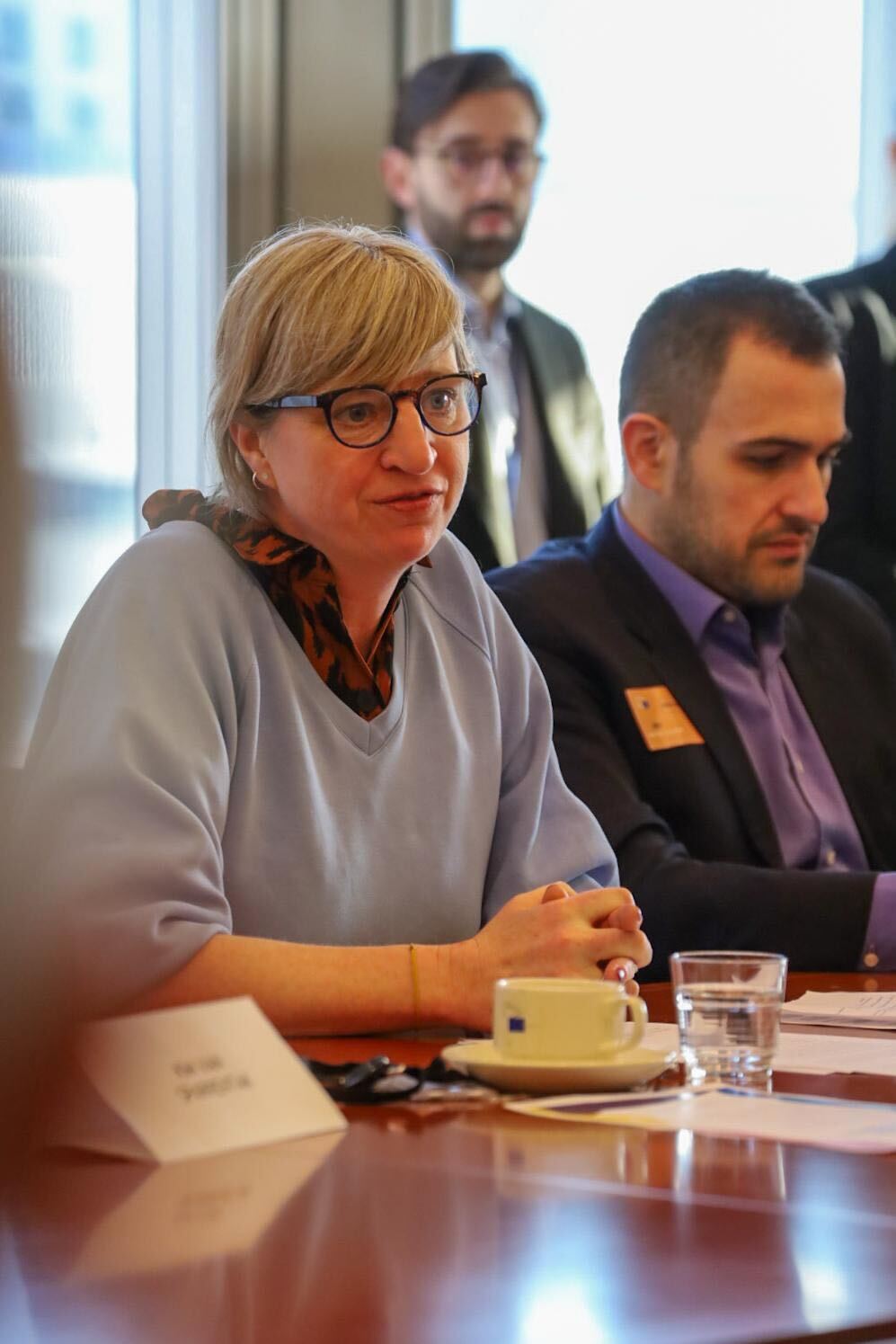
At the launch of our 2025 Annual Review, ILGA-Europe’s Advocacy Director, Katrin Hugendubel delivered a stark warning about the growing wave of anti-LGBTI hate, misinformation, and legislative attacks across the region. As governments weaponise discrimination to undermine democracy, she called for urgent political action to protect fundamental rights and freedoms. In today’s blog we share the full text of her speech.
Our Annual Review of the Human Rights Situation of LGBTI People in Europe and Central Asia, released this week, strives to provide a clear and comprehensive overview of the realities on the ground. The findings are based on individual cases, notable events, and legislative, political, and social developments, as well as data gathered from our own work and insights from LGBTI activists across the 54 countries covered in the report.
In recent years, LGBTI activists and organisations across Europe and Central Asia have repeatedly highlighted the worrying rise and normalisation of hate and violence in our region, including numerous attacks on LGBTI rights that systematically undermine fundamental freedoms.
The 2025 Annual Review once again evidences a clear increase in hate and violence. Furthermore, it illustrates how ongoing LGBTI-phobic hate and misinformation campaigns have laid the groundwork for legislation such as anti-propaganda and foreign agent laws. These laws, which ostensibly target LGBTI rights, actually extend much further—introducing censorship, stigmatisation, and persecution of human rights defenders and opposition voices; anti-democratic interference in elections through disinformation campaigns; and, ultimately, laws that erode fundamental freedoms and the principles of democracy. LGBTI rights are being used as an entry point for broader repressive measures.
LGBTI-phobic hate speech, sexism, and misogyny are increasingly normalised, often fuelled by public figures, including political and religious leaders and state institutions. Politicians in several countries, including Austria, Belgium, Bosnia & Herzegovina, Czechia, Moldova, and Romania, have weaponised discriminatory narratives against LGBTI people during election periods.
To cite just a few examples: in Austria, the far-right FPÖ spoke of “transgender brainwashing” and sought to cut taxpayer funding for what it termed “queer experiments”. In Belgium, Vlaams Belang repeatedly invoked the notion of “gender madness”. The President of Republika Srpska in Bosnia & Herzegovina was fined for hate speech during the election campaign.
The Georgian Elections Observatory (GEO), which focuses on fact-checking pre-election narratives, analysed statements made by senior members of the ruling Georgian Dream party, revealing that ‘LGBT propaganda’ was framed as a Western imposition and linked to a perceived threat to national survival. A similar misinformation campaign in Moldova suggested the country would be overrun by the Western LGBTI agenda ahead of the October elections. In Romania, Călin Georgescu’s electoral campaign during the first presidential election round intensified hate speech against the LGBTI community, even advocating for the re-criminalisation of homosexuality in the Penal Code.
Hate crimes and violent incidents have been reported in the vast majority of countries covered in this report. In Albania, these include stoning attacks against lesbian activists and physical assaults on trans women, with no accountability measures taken. A migrant trans woman was murdered in a hotel room in Copenhagen. Just one day after the Georgian Parliament passed its anti-LGBTI law, celebrity trans woman Kesaria Abramidze was found brutally murdered in her apartment.
In Armenia, while the successful prosecution of the country’s first hate crime against a gay man marks progress, violence against trans people remains unaddressed, and draft anti-discrimination legislation continues to stall. In Germany, during Pride season (June–September 2024), the Centre for Monitoring, Analysis and Strategy documented a surge in extremist mobilisation against Pride events across 27 cities, involving violence and intimidation. The Federal Ministry of the Interior reported 22 protests in this period.
The French Ministry of the Interior released a report showing a 13% increase in anti-LGBTI offences in 2023, with assaults, threats, and harassment rising by 19%, totalling 2,870 cases. The country chapter for France this year lists numerous homo- and transphobic attacks, including two transfemicides. Similarly, Italy recorded a troubling increase in bias-motivated violence in 2024.
Governments are actively fuelling anti-LGBTI sentiment, often followed by legislative proposals restricting freedom of expression, association, and fair elections. In seven countries across the region, so-called ‘LGBT propaganda’ laws, which seek to criminalise LGBTI visibility, ban content, silence activists, and restrict freedom of assembly, were either discussed, proposed, or adopted.
In Kazakhstan, parliamentarians proposed including “LGBT propaganda” in the list of extremist crimes under the Criminal Code, with penalties of up to seven years’ imprisonment. In Romania, a draft law was introduced to censor LGBTI issues in schools, the media, and public spaces, also seeking to ban Pride marches and related public assemblies.
The most far-reaching of such laws came into force in Georgia last December. The “Protection of Family Values and Minors” law prohibits non-heterosexual people from adopting children, prevents
trans and intersex people from changing their gender markers on documents, outlaws public gatherings that promote same-sex relationships, and bans educational institutions from presenting what the government terms “LGBTI propaganda”. It also prohibits legal gender recognition, criminalises medical procedures related to transitioning, equates same-sex relationships with incest, and designates 17 May as a “Day of Family Purity and Respect for Parents”.
Other countries have focused on targeting the education sector, restricting or outright banning LGBTI topics from curricula and awareness-raising initiatives. In Hungary, teachers fear mentioning SOGIESC (Sexual Orientation, Gender Identity and Expression, and Sex Characteristics) topics in classrooms due to the anti-LGBTI law—a fear that has now spread across the region.
Similarly, access to trans-specific healthcare, particularly for minors, has been a major target in 2024. Politicians and governments have exploited trans healthcare as a campaign issue. For instance, Austria’s Chancellor and ÖVP leader proposed banning hormone treatments for under-18s without medical justification and included this in the party’s election manifesto. In Germany, the CDU pledged in its election manifesto to repeal the newly enacted legal gender recognition law. Following the UK Cass Review, barriers to trans healthcare have intensified in France, Italy, Ireland, Poland, the UK, Andorra, Georgia, Hungary, Moldova, Romania, and Russia, placing trans lives at further risk.
Governments are increasingly adopting Russian-style tactics, forcing human rights NGOs to register as ‘foreign agents’ to undermine their legitimacy, restrict funding, and stifle human rights activism. In 2024, Bulgaria, Georgia, Hungary, Kyrgyzstan, and Montenegro proposed or adopted foreign agent laws, posing a direct threat to civil society. In Russia and Turkey, human rights defenders are already labelled as foreign agents or state threats.
As an increasing number of governments crack down on fundamental rights, LGBTI people are being forced to flee persecution, even within Europe and Central Asia. Yet, many European countries are denying asylum claims based on inadequate assessments of country situations or arbitrary credibility judgements. In Germany and Ireland, for example, several LGBTI asylum seekers from Ghana were denied asylum despite facing significant threats to their lives.
Despite these challenges, LGBTI activists remain resilient. They continue to organise Prides, provide support for the most vulnerable, and fill gaps in essential services, such as homelessness support and humanitarian aid in Ukraine. Progress is still being made: Germany has adopted legal gender recognition based on self-determination, workplace protections have been strengthened, and sexual orientation and gender identity have been included in educational curricula in Czechia, Serbia, Slovenia, and Switzerland.
While governments scapegoat LGBTI people and introduce restrictive laws, courts across Europe are upholding LGBTI human rights, issuing key rulings on asylum procedures, hate speech, freedom of expression and association, legal gender recognition, and sexual and reproductive rights. However, political leaders must not rely solely on courts to protect human rights.
This report underscores a global trend: the normalisation of anti-LGBTI rhetoric is a direct assault on the democratic principles that underpin our societies. Political leaders at both the European and national levels must act decisively to counter these growing attacks on democracy.
Click here to download the 2025 Annual Review, see our trends analysis, or search by country, theme, or institution.
New Era of Coordinated Attacks on Foundations of Fundamental Rights, European Report Finds
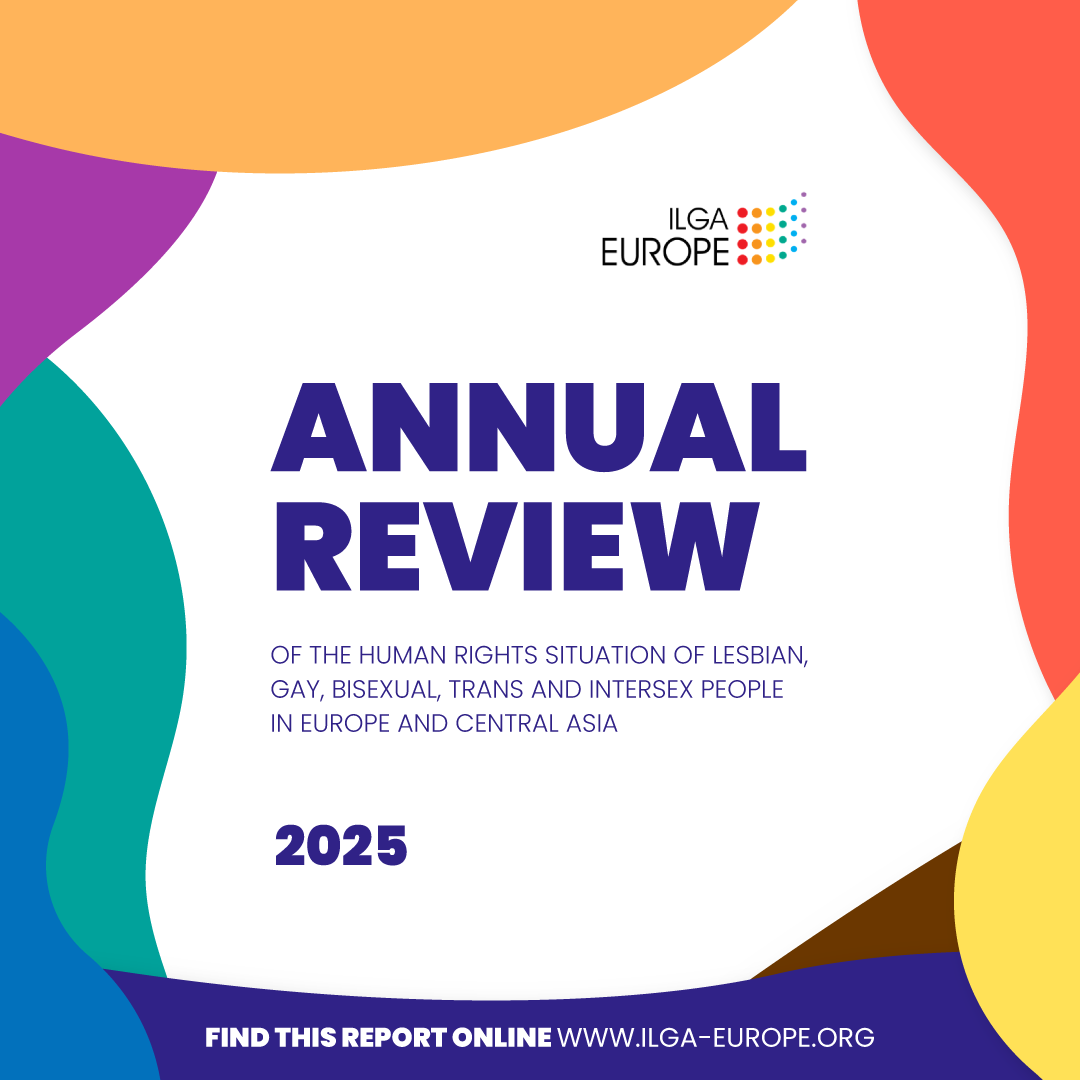
A major report published today identifies how LGBTI people are being weaponized to erode the foundations of freedom and democracy across Europe.
Released today, February 18, 2025, ILGA-Europe’s ‘Annual Review of the Human Right Situation of LGBTI People in Europe and Central Asia’ warns of a new era in which rising anti-LGBTI legislation threatens fundamental rights. Governments are fueling anti-LGBTI sentiment to push laws that restrict freedom of expression, association, and fair elections.
Governments are increasingly adopting tactics similar to Russia’s, forcing NGOs to register as ‘foreign funded’ to undermine their legitimacy, restrict funding, and stifle human rights activism. Known as ‘foreign agent’ laws, these measures are framed as protecting families and traditional values while often specifically targeting LGBTI NGOs. Last year in Bulgaria, Georgia, Hungary, Kyrgyzstan, and Montenegro, proposed foreign agent laws posed a direct threat to civil society.
Such legislation is enacted with or in the wake of so-called ‘LGBT propaganda’ laws that seek to criminalise visibility of LGBTI people, ban content, silence activists and restrict freedom of assembly, which have been either discussed, proposed or adopted in seven countries (Azerbaijan, Belarus, Bulgaria, Georgia, Kazakhstan, Romania, and Slovakia). These laws have been increasingly leveraged in education sectors, restricting or entirely preventing the inclusion of LGBTI issues in curricula and awareness-raising initiatives. In addition, attempts to introduce legislation excluding LGBTI topics from sex education were recorded in Bulgaria, Hungary, Italy, the Netherlands, Luxembourg, Norway, Romania, Russia and Slovakia.
In this context, LGBTI-phobic hate speech, sexism and misogyny are increasingly normalised, often fuelled by public figures, including political and religious leaders and state institutions. This is in turn driving an unprecedented surge in violence as hate crimes have reached record levels across the region.
The normalisation of hate is also providing justification for the blocking of healthcare for trans people. Andorra, Georgia, Hungary, Ireland, Moldova, Romania, Russia, and the UK have all put in place new barriers to care. Following the UK Cass Review, efforts to restrict trans healthcare for minors have emerged in Austria, France, Italy, Ireland, Poland, and the UK, putting trans lives further at risk.
As an increasing number of governments crack down, LGBTI people are being forced to flee—but Europe is closing its doors. Russia, Kyrgyzstan, and Turkey are intensifying persecution, and Turkmenistan is entrapping and torturing LGBTI individuals. Yet, many European countries, including Austria, Belgium, Bulgaria, Ireland and the UK, are denying asylum claims based on outdated, arbitrary assessments, with some officials rejecting applicants for not ‘seeming LGBTI enough.’
According to ILGA-Europe’s Executive Director, Chaber: “This report confirms what many of us have feared—we are entering a new era where LGBTI people have become the testing ground for laws that erode democracy itself. Across Europe and Central Asia, governments are using anti-LGBTI rhetoric to justify restrictions on free speech, civil society, and fair elections. What begins as an attack on LGBTI rights rapidly grows into a wider assault on the rights and freedoms of all individuals in society. This is not just an LGBTI issue; it is a crisis for human rights and democracy as a whole.”
ILGA-Europe’s Advocacy Director, Katrin Hugendubel added: “While governments are increasingly scapegoating LGBTI people to push restrictive laws, the courts both in the EU and across Europe are in turn upholding LGBTI human rights, with key judgements on procedures for LGBTI asylum seekers, anti-LGBTI hate speech, freedom of association and expression, legal gender recognition, and sexual and reproductive rights. But at this critical time, our leaders cannot simply leave the protection of human rights to the courts. Politicians at both the European and national levels must act decisively to counter the growing attacks on the cornerstones of democracy we are seeing. The normalisation of anti-LGBTI rhetoric is not just a threat to one community—it is now a proven direct assault on the democratic principles that underpin our societies.”
Further Information
Download a full analysis of the trends here
Read the ILGA-Europe’s Annual Review here
See up-to-date legislative developments in each country with ILGA-Europe’s Rainbow Map
Lithuanian Court Declares anti-LGBTI law unconstitutional
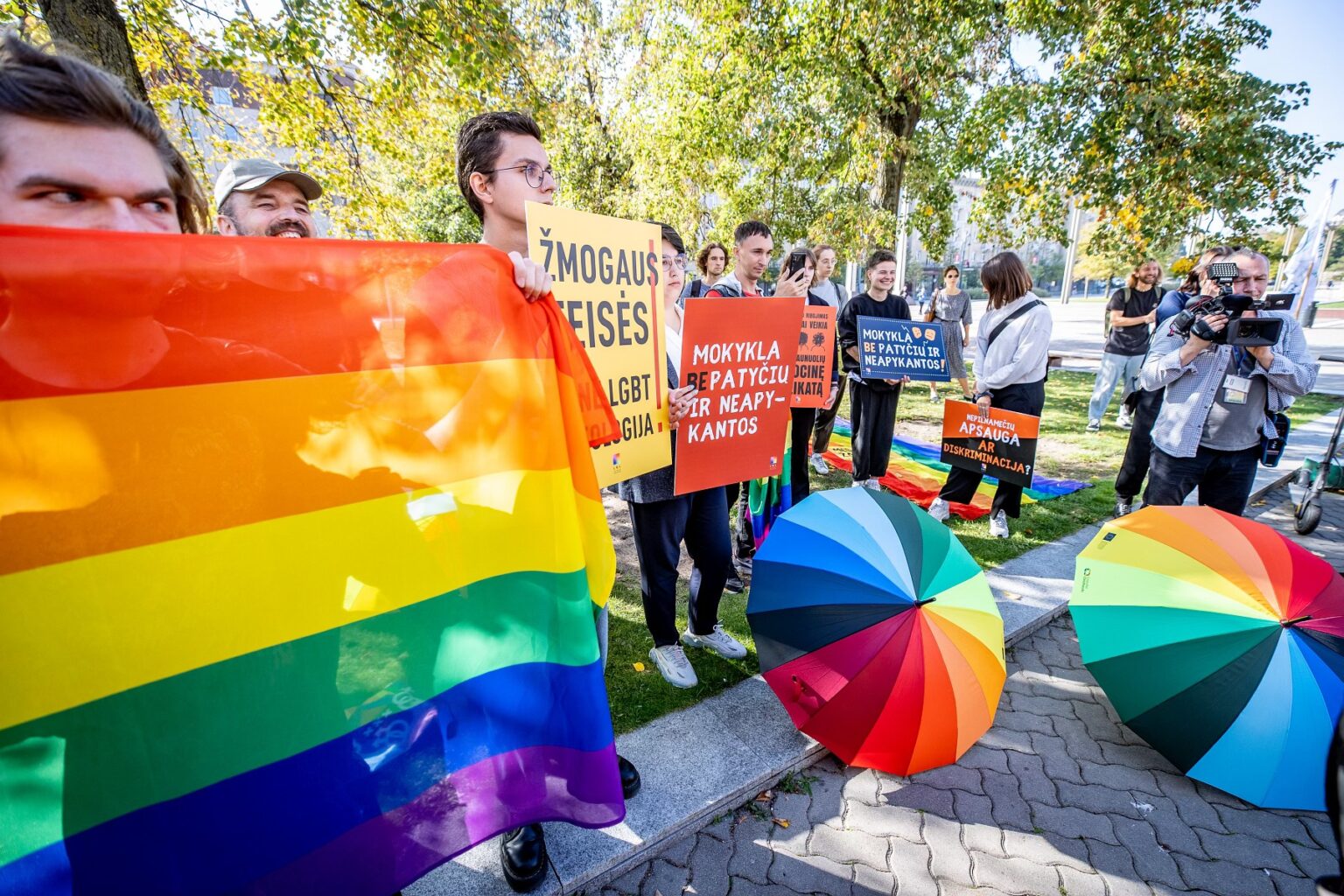
In a significant decision yesterday, Lithuania’s Constitutional Court ruled that a 15-year long ban on public depictions of LGBTI families should be repealed.
The Constitutional Court of Lithuania has declared the anti-LGBTI provisions of the Law on the Protection of Minors from Negative Effects of Public Information unconstitutional. These provisions, in place since 2009, had prohibited the depiction of LGBTI families in the public sphere, effectively stifling representation at public events and in the media.
The decision follows the European Court of Human Rights’ 2023 ruling in Macatė v. Lithuania, which found the law to violate Article 10 of the European Convention on Human Rights, safeguarding the right to freedom of expression. ILGA-Europe supported this case through a third-party intervention alongside Article 19 and the International Justice Clinic.
ILGA-Europe in association with the Lithuanian Centre for Human Rights and the Human Rights Monitoring Institute also supported our member organisation, LGL, through a Rule 9 submission to the Committee of Ministers of the Council of Europe concerning the implementation of the Macatė judgment.
The court’s reasoning empahsizes that:
- Information about diverse family models cannot be deemed inappropriate for minors.
- Laws must uphold respect for human rights, dignity, equality, pluralism, and tolerance.
- Minors deserve access to information that fosters their development into mature, well-rounded individuals.
According to Katrin Hugendubel, Advocacy Director at ILGA-Europe: “This landmark ruling marks a significant step towards ensuring that the rights of LGBTI people are respected in Lithuania. With this ruling, the anti-LGBTI provisions become ineffective and cannot be applied anymore. This is another confirmation from a highest courts that such laws are a violation of human rights and other courts should follow suit.”
Find out more about the current situation of protection of human rights of LGBTI people in Lithuania, on our interactive Rainbow Map.
For further context and details, see LGL’s statement here.
LGBTI rights are human rights
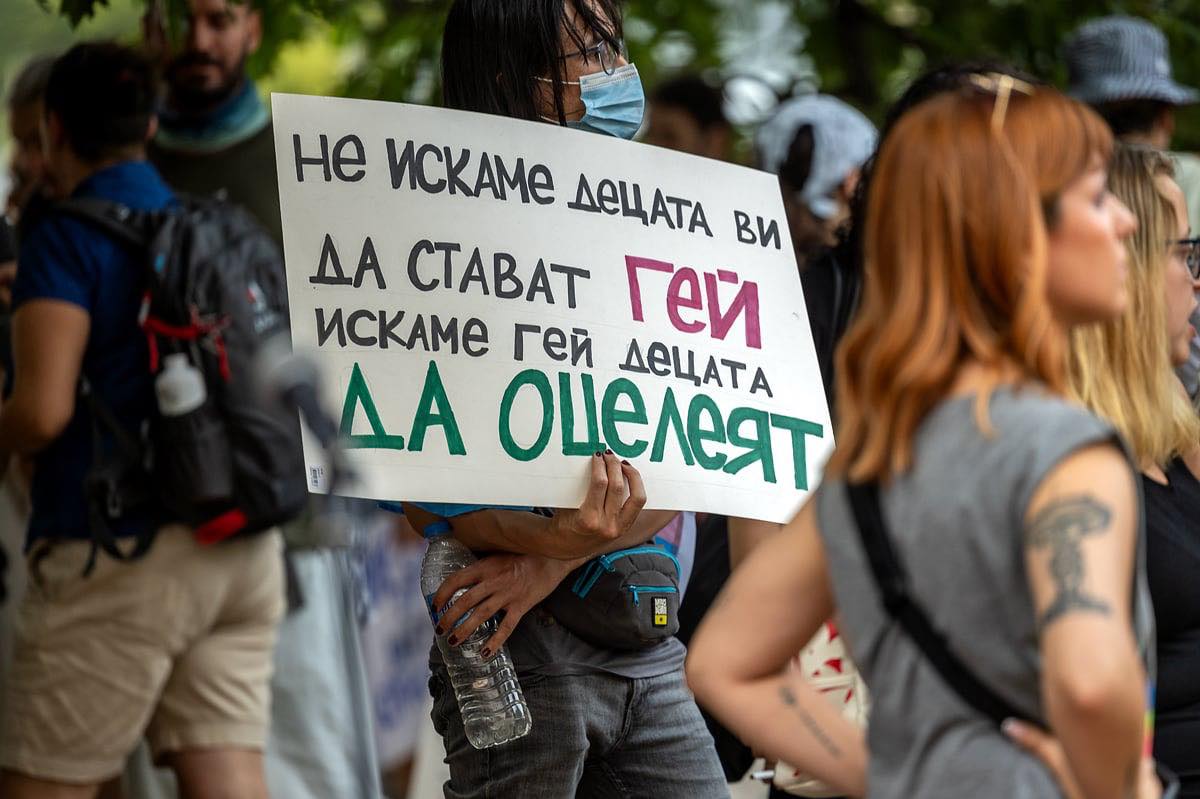
On Human Rights Day we reflect on struggles and milestones for the European and Central Asian LGBTI movement in 2024.
Human Rights Day reminds us of the universality of human rights: freedoms that belong to all people, no matter their identity. This principle is at the heart of the LGBTI movement, as LGBTI rights are human rights. In 2024, these rights were both challenged and celebrated, often reflecting broader societal shifts.
Across Europe and beyond, anti-LGBTI measures highlighted the fragility of hard-won freedoms. Georgia adopted both a “foreign agent” law and an “anti-LGBTI propaganda” law, echoing a troubling global trend of restricting civil society and stifling dissent. On December 2nd, the restrictive law came into force, banning legal gender recognition and equating same-sex relationships with incest, further institutionalising discrimination against LGBTI communities. The law also declared May 17 a holiday opposing the International Day against Homophobia, Transphobia, and Biphobia, amplifying the state’s anti-LGBTI stance. Bulgaria introduced laws targeting the discussion of LGBTI issues in schools, marking another attack on both education and freedom of expression. In Russia, the international LGBTI movement was branded as “extremist” in late 2023, but 2024 saw the first convictions under this extremist label, intensifying the risks for activists and organisations. Kyrgyzstan followed suit by enacting a Russian-style “foreign agents” law in April, subjecting non-profits to extensive state oversight and jeopardising the work of press freedom groups and civil society, including LGBTI organisations.
These developments show how attacks on LGBTI rights often signal deeper human rights violations. In Turkey, trans rights faced severe setbacks with new regulations restricting access to essential hormones, disproportionately affecting trans masculine people and those in poverty. Police repression of LGBTI demonstrations further highlighted the shrinking space for activism and public dissent. The suppression of freedom of speech, association, and democratic principles often accompanies discrimination against LGBTI communities. As such, defending LGBTI rights is part of defending the foundations of democracy and equality for all.
Progress, despite setbacks
Despite these setbacks, 2024 was also a year of hope and progress. Germany’s adoption of a self-determination law marked a major step forward for trans and non-binary people, simplifying legal gender recognition. Greece joined the growing list of European countries recognising equal marriage, while Malta’s introduction of non-binary markers on official documents underscored its commitment to inclusivity.
Beyond Europe, global human rights institutions also made strides for LGBTI people. The UN Human Rights Council adopted a resolution affirming the rights of intersex people, a relevant step in recognising and addressing the unique challenges they face. The European Court of Human Rights ruled that Poland must provide legal recognition for same-sex couples, and the Court of Justice of the European Union declared that Romania must respect gender recognition granted in other countries.
Ensuring no one is left behind
These moments of progress illustrate that advancing LGBTI rights benefits societies as a whole. Laws that affirm equality and dignity strengthen the social fabric, ensuring that no one is left behind. This year’s developments—both the setbacks and the victories—show that progress is possible, but it requires vigilance, solidarity, and collective action.
In February 2025, ILGA-Europe will publish its Annual Review, documenting these and other critical moments from the past year. Stay tuned!
Interview with Denitsa Lyubenova: Bulgaria’s LGBTI crisis and what the international community can do to help

Amidst growing oppression, Bulgarian activists rally for LGBTI rights and call for European solidarity
Bulgaria has recently passed a draconian law banning “LGBTI propaganda” in schools, echoing similar legislation in Russia and Hungary. This has sparked widespread fear and uncertainty within the LGBTI community. To shed light on the situation, we spoke with Denitsa Lyubenova from Deystvie, an organisation at the forefront of the fight for LGBTI rights in Bulgaria.
A community in shock and resilience
When the anti-LGBTI law was swiftly passed, the shockwaves were immediate. “It happened so quickly,” Denitsa recounted. “Within just one day, everything changed. The environment in the country turned hostile almost overnight.” The sudden enactment of the law, coupled with the overwhelmingly negative media coverage, has left the community reeling. “People are scared, and there’s a deep sense of hopelessness,” she explained. Many activists, who have spent years pushing for incremental progress, now find themselves grappling with a wave of despair. “Everything we’ve fought for feels like it’s been shattered overnight,” Denitsa shared.
Despite the grim outlook, the resilience of Bulgaria’s LGBTI activists is evident. In response to the law, organisations and activists have mobilised quickly, organising protests and petitions, and rallying international support. Denitsa emphasised the critical role that international bodies like the European Parliament and the European Commission must play in exerting political pressure on the Bulgarian government.
The legal battle ahead
One of the most pressing challenges for the LGBTI community is the legal harassment they face. Denitsa’s organisation, along with others, has formed a legal team comprising 16 professionals, including university professors and community members, to strategise their fight against the law. “We’ve built a strong team to brainstorm ways to fight this law and any future ones,” she explained. This team is not just focused on challenging the current legislation but also on preparing for future legal battles.
The situation is particularly dire for organisations like Single Step, which has been targeted with threats to revoke its license to work with children. Denitsa herself has been subjected to police inquiries and investigations, a clear indication of the increasing pressure on visible LGBTI activists. “We’ve already had to visit the police several times due to investigations into our work,” she shared. Despite the severity of these threats, Denitsa remains defiant, “We’ve been threatened before, but it hasn’t stopped us, and it won’t stop us now.”
Personal toll on activists
The intensity of the situation is taking a personal toll on activists. Denitsa spoke candidly about the strain of being on the frontlines, acknowledging that the past 20 days have been particularly overwhelming. “It’s emergency time,” she said, noting that self-care has become a rare luxury. Despite the pressures, she finds solace in moments of disconnect, like escaping to the mountains, though such moments have been scarce recently. “My partner is a psychologist, which helps,” Denitsa laughed about with a hint of relief. “But the situation demands so much attention that finding time to step away has been nearly impossible.”
Overlooked aspects of the crisis
One aspect that shouldn’t be overlooked in this situation is Bulgaria’s ongoing political instability. The country has seen six elections in four years, creating an environment where far-right forces can push through conservative agendas with alarming ease. “This political instability gives far-right groups a golden opportunity to push their conservative laws and suppress civil society,” Denitsa warned. She stressed the importance of international collaboration to counteract this political crisis “We need to fight this together, on an international level, to prevent further damage.”
Call to action: Support Bulgarian LGBTI activists
Denitsa’s message to European LGBTI organisations is clear: the Bulgarian community needs your support. She urges activists across Europe to sign the petition launched by Deystvie and their partners, and to help raise awareness about the situation in Bulgaria. “We’re providing pro bono legal support to teachers and school directors who may be sanctioned under this law,” she explained. That is why financial support is also crucial, as organisations like Deystvie prepare for a prolonged legal and advocacy battle. Contributions can be made directly through their website, where details for donations are provided.
This is a critical moment for the LGBTI community in Bulgaria. While the challenges are immense, the solidarity and support from across Europe can make a significant difference. As Denitsa aptly put it, “We have to be prepared for the long run. We don’t know when this crisis will end, but we’re not giving up.”
Bulgaria passes anti-LGBTI propaganda law
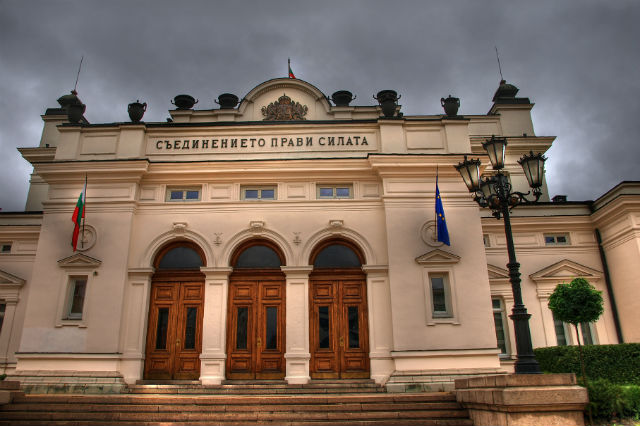
ILGA-Europe have condemned a fast-tracked law banning the portrayal of LGBTI identities in Bulgarian educational institutions, warning that it is an attack on children’s rights and a distraction to secure votes for far-right and Russia-aligned parties in forthcoming elections.
Today the Bulgarian Parliament voted with almost a full majority to adopt an anti-LGBT propaganda law which prohibits “the carrying out of propaganda, promotion and incitement in any way, directly or indirectly, of ideas and views related to non-traditional homosexual orientation and/or the determination of gender identity other than biological” in the system of pre-school and school education, by amending the Preschool and School Education Act (PSEA).
In both the reasoning behind the bill and during today’s debates it was mentioned that content “in the vicinity of” these educational establishments should also be banned. This means that any portrayal of LGBT people will be banned from schools and pre-schools, as well as any entity in the vicinity of them.
Both the first and second readings were held today, seven days after passing the Committee, in a clear fast tracking of the legislation through parliament in their last session before the summer and while most watchdogs and international institutions are on holiday.
The Revival Party drafted the law using wording based off the Russian and Hungarian anti-LGBT propaganda laws, which both countries have been promoting in Europe. The Revival Party is a member of the the Europe of Sovereign Nations group of the European Parliament, which includes MEPs who have declared interest in forming a “pacifist” and eurosceptic group to improve relations with Russia, and MEPs who were expelled from the Identity and Democracy (ID) Group shortly before the European election, due to reports of Nazi sympathising.
According to the Executive Director of ILGA-Europe, Chaber: “The proponents of the law, the Revival Party, and all those who voted in favour of the law claim that this is to protect young people, however the truth is that this is an attack on the rights of children, particularly LGBTI children.”
The aim of the law is extremely similar to the Russian anti-LGBT propaganda law adopted in 2012, and the Hungarian anti-LGBT propaganda law adopted in 2021, both of which have been deemed by various international stakeholders and institutions as incompatible with international and European human rights standards (see the Venice Commission’s opinions on the Russian[1] and Hungarian laws[2]).
The Venice Commission of the Council of Europe has repeatedly found such anti-LGBT propaganda laws to be in violation of the European Convention on Human Rights (ECHR). The more recent Venice Commission Opinion on the Hungarian anti-LGBT propaganda law found it to be incompatible with the ECHR and international human rights standards, including the law’s amendments regarding the educational sector.
It found that the law “fails to comply with the positive obligation of Hungary to ensure that the educational system provides children with objective and non-biased information on gender identity and sexual orientation and protects them from discrimination on the same grounds.”
According to Denitsa Lyubenova, Lawyer at LGBTI organisation Deystvie in Bulgaria: “The previous opinion of the Venice Commission makes it clear that such “anti-propaganda” bills put children and youth at risk by contributing to creating a threatening environment where LGBTI children can be subject to health-related risks, bullying and harassment, and they exclude LGBTI people from fully participating in a democratic society.”
A growing trend in Europe
This law follows repeated attempts in recent years by the Revival Party to table a Russia-style Foreign Agent Law, which would see civic space severely curtailed and contribute to the erosion of democratic checks and balances. In fact, this combination of Russian-style Foreign Agent laws and anti-LGBT propaganda laws is a growing trend in Europe, with Georgia most recently having adopted a Foreign Agent Law in May this year and then only five days later announcing an anti-LGBT legislative package which includes a ban on LGBT content in education, media and the arts.[3]
Says ILGA-Europe’s Executive Director, Chaber: “Today’s fast-tracking of this law through the Bulgarian parliament is a clear attempt to avoid scrutiny, and highlights the political nature of this law. Both Bulgaria and Georgia have national elections upcoming in October. LGBTI people are being used in both scenarios as scapegoats and as a distraction to secure votes for far-right and Russia-aligned political parties.”
The European Commission has highlighted, in its 2024 Rule of Law report, that the current procedure of legislative initiatives tabled by MPs in Bulgaria does not adhere to desired standards, such as allowing civil society consultation, conducting impact assessments, and assessing compliance with EU law.[4] This adopted law is a clear example of these rule of law shortcomings.
Says Chaber: “Given the extremely fast-tracked procedure for this law, its clear political aim is to scapegoat LGBTI people and legislate against their human rights. It is incompatible with Council of Europe and EU standards on law-making and non-discrimination. As such, ILGA-Europe request that the European Commission assess the law’s compatibility with EU law and call for a strong reaction from all EU Member States.”
[1] https://www.venice.coe.int/webforms/documents/default.aspx?pdffile=CDL-AD(2013)022-e
[2] https://www.venice.coe.int/webforms/documents/?pdf=CDL-AD(2021)050-e
[4] European Commission (2024), Rule of Law report, Bulgaria chapter, accessible at: https://commission.europa.eu/document/download/fd6bb85d-4aaa-4c79-88a2-8709edfb2002_en?filename=10_1_58051_coun_chap_bulgaria_en.pdf
[5] (C/2023/8627 final) https://eur-lex.europa.eu/legal-content/EN/ALL/?uri=PI_COM%3AC%282023%298627
[6] See pp 33-34.
The fight against Georgia’s foreign agent law and anti-LGBTI legislation
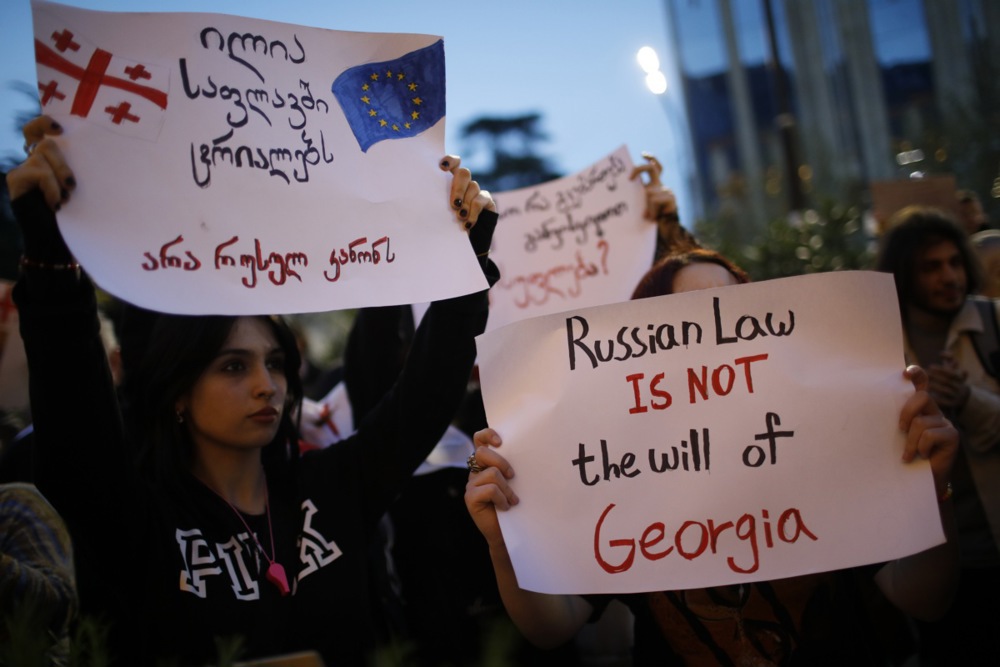
In the face of rising authoritarianism, Georgia’s civil society and LGBTI community are battling draconian laws inspired by Russia, threatening their democratic rights and freedoms ahead of a pivotal national election
On 14 May 2024, the Georgian parliament passed a Foreign Agent law that would see civil society and independent media that receive more than 20% of their funding from abroad forced to register as organisations “bearing the interests of a foreign power” and to open all their internal documents for inspection by the authorities. The bill is part of a wider crackdown on democracy by the ruling Georgian Dream party, which has been inspired by the almost identical foreign agent law enacted in the Russian Federation in 2012.
Opposition to this bill has been significant among Georgian society, which supports democracy, EU accession and a thriving civic space, and is opposed to Russian-style anti-democratic laws. There were huge protests all over Georgia, in which tens of thousands demonstrated in the streets against the adoption of this law. Georgian civil society organisations, including LGBTI organisations, are fearful that more legislation will be adopted which will target civil society and democratic checks and balances.
Targeting the LGBTI community
One such legislation package, announced on 4 June 2024, specifically targets the LGBTI community. If adopted, it would:
- Ban any kind of medical intervention to change sex, such as hormone therapy
- Ban any LGBTQI content in education, in media, in the arts
- Ban legal gender recognition
- Ban adoption for same-sex couples
- Limit freedom of assembly for events that cause “popularisation of same sex marriages or incest”
- Make biological sex markers mandatory
These proposed legislative changes also borrow from Russia’s playbook by singling out the LGBTI community as a target and scapegoat. This legislation is being fast tracked for adoption before the national elections taking place on 26 October, with a first reading and favourable vote having taken place in June and the final two readings scheduled for September.
The combination of both the foreign agent law and the anti-LGBTI legislation would render the functioning of LGBTI civil society organisations and activists in Georgia almost entirely impossible. Already in May, the Council of Europe’s Commissioner for Human Rights commented on how the foreign agent law would specifically target LGBTI civil society. On 21 May, the Venice Commission published an Urgent Opinion on the foreign agent law, concluding that the law’s restrictions on the rights to freedom of expression, freedom of association and privacy are incompatible with international and European standards regarding democracy and non-discrimination.
Mobilising international support
ILGA-Europe conducted advocacy ahead of the June session of the Parliamentary Assembly of the Council of Europe (PACE), to draw attention to the anti-LGBTI law also during the urgent debate on Georgia. We requested parliamentarians to raise the issue of LGBTI people being impacted by both the foreign agent law and the anti-LGBTI law, which a number did. In particular, parliamentarian Beatrice Fresko-Rolfo spoke entirely on this, highlighting how the anti-LGBTI legislation restricts the fundamental rights of LGBTI people including freedom of expression and freedom of assembly, and reflecting on what will happen to the LGBTI community of Georgia if these legislative changes are adopted.
Following the debate, PACE resolution “Challenges to democracy in Georgia” was adopted by the Assembly, addressing the foreign agent law, the violent attacks and intimidation campaigns, the electoral law changes, and the anti-LGBTI law. The Assembly also will address the foreign agent law in a separate upcoming resolution.
Sharp rise in violence
This has all been taking place while the Georgian government and its allies allow for violent attacks and intimidation campaigns against demonstrators, civil society activists, journalists, and opposition MPs. The offices of LGBTI organisations Tbilisi Pride and WISG have been vandalised, and the private homes of their staff have also been targeted by vandalism and intimidatory posters. LGBTI human rights defenders and their families are receiving threats of violence, including death threats. 20 other civil society organisations and opposition party offices have also been vandalised. As this violence and intimidation is condoned by the government, incidents of physical violence are also increasing. Activists expect a hate campaign to be led by the government in the lead up to the national elections taking place on 26 October 2024, and therefore for the hatred and violence to rise even more in September.
The electoral context
The foreign agent law will make it difficult for international organisations to observe the elections for any irregularities in October, adding to the fear that the elections will not be free and fair. This comes after the 20 February 2024 adoption of amendments to Georgia’s Electoral Code, which made it possible for the ruling majority, by itself, to select and appoint the chairperson and non-partisan members of the Central Election Commission (CEC), and which altered the legally required majorities for decision making by the CEC. These changes combined make it possible for the government to control all decisions of the CEC.
If the current ruling party wins the elections, they have made it clear that they will concretise the anti-LGBTI legislation into Georgia’s constitution through constitutional amendments. They also plan to hold a referendum on Georgia’s EU accession. We should expect more anti-democratic and anti-human rights legislation and policies and a broader turn towards Russia and away from the EU.
What can be done?
Georgian civil society will be casting their votes on 26 October for a democratic, pro-EU opposition. They rely on a change in government to halt Georgia’s current anti-democratic path and to repeal these laws that seek to stifle civil society and democratic opposition, and target the fundamental rights of LGBTI people. If the opposition wins in October, it is paramount that they do indeed repeal the foreign agent law and the anti-LGBTI amendments, and set Georgia back on a path to democracy and EU accession. This is especially important given the strength of the anti-gender and anti-rights movement currently pushing various countries in the region towards more autocratic governance, which needs to be strongly opposed by democratic parties. We call on all international actors to support us in ensuring that these laws are repealed if the Georgian opposition wins.
If, however, the current ruling party, Georgian Dream, wins the election, LGBTI civil society and Georgian civil society at large will need intensified support from international donors who should work hand-in-hand with Georgian civil society organisations to see how they can best be supported. In addition, it is widely concluded that the only effective way to hold Georgian MPs accountable for voting against human rights and democracy is through targeted sanctions affecting these individuals, rather than sanctions that would impact the broader economy and people of Georgia.
Statement in solidarity with the LGBTI movement in Kazakhstan

ILGA-Europe stands with Kazakhstan’s LGBTI Community amid Russia-style attempts to criminalise LGBTI people and their human rights
ILGA-Europe express solidarity with the LGBTI community in Kazakhstan as they face legislative proposals which will worsen the already exacerbated situation of the LGBTI community in the country. Two concerning anti-LGBTI legislative initiatives that were voiced last week by two separate groups of members of Kazakhstan’s Parliament threaten the fundamental rights and freedoms of LGBTI individuals in Kazakhstan.
The initiative by the Parliament members Aimagambetov and Ashimzhanov (both from Amanat Party) attempt to introduce a legal prohibition for mass media to write about “non-traditional sexual orientation”. In the same week, Parliament members Zhanbyrshin and Musabaev (also from Amanat party) introduced a draft amendment to include so-called “propaganda of non-traditional sexual relations” in the “discord incitement” provision 174 of the Criminal Code and to prohibit peaceful assemblies on the same ground.
Such initiatives aim to divert attention from pressing issues like natural disasters that the entire northern and western Kazakhstan has been suffering for the past few weeks, with so many villages and towns affected, and over 100,000 people relocated, as well as the nation’s worsening socioeconomic situation and rising public call for the elimination of domestic violence. We call on the Kazakhstan Government to not arbitrarily target the LGBTI community and violating the principles of non-discrimination enshrined in the Constitution of Kazakhstan.
In the past couple of weeks, according to some media reports and from information spreading in messenger chats, the Law Enforcement of Astana have been illegally raiding nightclubs, specifically targeting LGBTI people. This is demonstrative of how such anti-LGBTI discourse and initiatives directly reflect on the safety of LGBTI people.
Kazakhstan’s current legislation does not protect LGBTI people from bias-motivated crimes, places discriminatory and humiliating barriers for legal gender recognition, bans same sex marriage and adoption by LGBTI persons, among many other pressing issues. The existing provisions restricting human rights of LGBTI people and any further attempts to do so contradict Kazakhstan’s international legal commitments, including the implementation of Recommendation No. 139.48 within the Kazakhstan’s previous reporting under Universal Periodic Review cycle, which calls for creating an enabling environment for LGBTI activist groups and human rights defenders.
We are also deeply concerned about the implications of amending Article 14 of the Law on Peaceful Assemblies, which would restrict the right to peaceful assembly for the LGBTI community and other civil society actors. This move further marginalises an already vulnerable community and threatens the democratic principles Kazakhstan aspires to uphold.
ILGA-Europe denounces any attempts to introduce discriminatory legislation that targets the LGBTI community. The LGBTI community in Kazakhstan deserves legal protection and recognition without discrimination.
We urge the Parliament to refrain from any future attempts of adopting anti-LGBTI legislation, and start to engage in meaningful dialogue with civil society and expert organisations to ensure the protection of LGBTI rights. We call on Kazakhstan to uphold its constitutional duty to protect the rights of all citizens, including on the grounds of sexual orientation or gender identity.
We call upon the International Partners of Kazakhstan to join us in reinforcing the dialogue on asking the Government of Kazakhstan to work towards improving the situation with human rights of LGBTI people.
ILGA-Europe stand in solidarity with the LGBTI community in Kazakhstan and reaffirm our commitment to supporting their struggle for equality, dignity, and respect. We encourage individuals and organisations to join us in speaking out against discrimination and advocating for the rights of all LGBTI individuals in Kazakhstan.
BACKGROUND
On February 11, the Ministry of Information of Kazakhstan blocked the selftanu.kz website which aimed at raising awareness of LGBTI teenagers about their rights and providing them with information on healthcare and reproductive rights, among others. The Ministry justified its decision that the information on the website violates the norm of the legislation on preventing dissemination of information that would cause harm to the health and development of children.
On February 23, Kazakhstan’s President Tokaev signed the law preventing LGBTI people from mentoring orphans. When asked how the authorities would identify LGBTI identity of prospective mentors, the Vice-Minister of Education of Kazakhstan Natalia Zhumadildaeva stated that LGBTI people would be prevented from adopting and mentoring orphans according to these provisions. She claimed that the Ministry had developed a special psychological test for such purposes. Again these are non-scientific and inhumane approaches that contradict common sense and go against Kazakhstan’s national and international commitments to uphold human rights and non-discrimination.
On March 5 the authorities of the Almaty Mayor’s office responded to questions why it had prohibited the women’s inclusive rally dedicated to International Women’s Day marked on March 8. Almaty authorities recalled that over the past few years, representatives of feminist movements have already held authorised rallies on March 8. But officials were unhappy that during the protests the organisers and participants “repeatedly deviated from the stated topic.” They claimed that there had been numerous requests from different citizens not to allow the women’s rally, because reportedly “In appeals to them and in messages on social networks, the organisers of the rally, under the guise of the fight for women’s rights, actually promoted non-traditional values that were alien to Kazakh society such as same-sex relationships, marriages, LGBT symbols and others. And, in order to ensure the safety of participants in peaceful assemblies, in order to avoid violation of the rights of city residents and other persons, and to prevent violation of public safety by the Almaty authorities, a decision was made not to approve the rally of feminist organisations”.
On April 5, within the discussions of amendments to the Law on Mass Media, the first initiative was put forward by Parliament Members Askhat Aimagambetov and Zhanarbek Ashimzhanov (both from Amanat Party) to include provisions that would ban Mass Media from mentioning anything about LGBTI. This was followed by another more restrictive initiative on April 10 by Parliament Members Edil Zhambyrshin and Samat Musabaev (also from Amanat Party). In particular, they proposed an amendment to Article 174 of the Criminal Code (“Inciting social, national, tribal, racial, class or religious hatred”) to include criminal charges for those who break the law and publicly mention about LGBTI. Although, both provisions did not make it to the second reading of the bill and when it was passed to the upper Chamber of the Parliament. However, LGBTI activists fear these amendments may resurface as the initiators made it clear they would not withdraw their attempts to follow through.
For the past couple of weeks, according to media reports and information shared on messenger chats, law enforcement in Astana has been illegally raiding night clubs and specifically targeting LGBTI people under the false pretence of preventing illegal proliferation of drugs. Reportedly the police are also raiding private parties organised in apartments and houses, as well as nightclubs that are not specifically LGBTI-themed.
Statement: Kyrgyzstan targets LGBTI communities in a new law
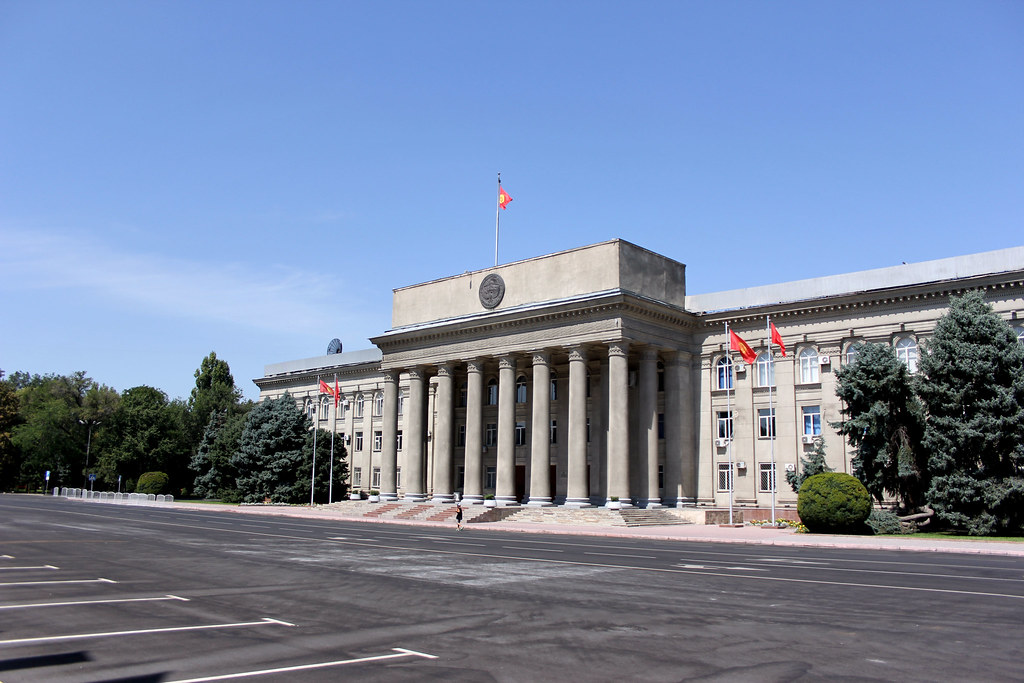
ILGA-Europe expresses solidarity and stands with LGBTI organisations and communities in Kyrgyzstan as the country’s President signed into law a discriminatory provision banning dissemination of information about LGBTI people, rights, and identities among minors.
We firmly assert that this specific provision in the new legislation does not protect anybody; instead, it deprives LGBTI children from access to services and support that they need to thrive and puts them at risk of harassment, violence and a generally hostile environment. The damaging effects of similar Russian legislation on the lives of children, as well as on the lived realities of LGBTI people in general, are well-documented.
Information about LGBTI people and identities is listed in the new law on a par with violent or pornographic content, and the adoption and discussion of this law unfolded in parallel with smear campaigns against LGBTI organisations, activists, and communities in Kyrgyzstan. This confirms that the new law is a deliberate attempt to stigmatise LGBTI people and to fuse LGBTI people and identities with abuse of children and exposing children to harm.
Finally, just like previously in Russia, Poland and Hungary, this legislation comes along with other anti-democratic developments, such as the draft law on media and the attempts to outlaw foreign funding, and is a precursor of other attempts to limit the space of independent civil society and media. It sounds an alarm for the entire civil society in Kyrgyzstan and its partner and ally organisations and demands a united front across different parts of the country’s civil society as well as international supporters, funders, and allies.
Together with our members and partners, ILGA-Europe will continue to advocate for the rights of LGBTI people in Kyrgyzstan and will be rallying support and solidarity for LGBTI organisations and their allies in the country.
Now that LGBTI organisations in Kyrgyzstan need to take their time to assess the situation and plan ahead, we encourage all supporters and allies to not rush to action but follow the lead of the LGBTI organisations in the country. It is also a moment for all of us to consider where our positions and resources could be most helpful, immediately and in the long term. Be it documenting the effects of the law on the rights and freedoms of LGBTI people and their allies, advocating for its repeal, offering security support, building solidarity across the civil society, or otherwise supporting different communities to counter the gaps and risks created by this law.
Background
On 15 August, Kyrgyzstan enacted a new law that aims to restrict freedom of expression and access to information about LGBTI people, identities, rights, and lives.
Formally, the law seeks to ban dissemination of harmful information among minors, while labelling as harmful also information that “denounces family and traditional societal values, promotes non-traditional sexual relations and initiates disrespect towards parents or other family members.” This language echoes the ‘anti-propaganda’ laws that are in place in Russia and Hungary.
The law comes into force on 30 August, 15 days after its publication.
The official title of the law is “On introducing amendments to several legal acts of the Kyrgyz Republic”, and it amends the Code of Misdemeanors, the law “On measures to prevent harm to children’s health, physical, intellectual, mental, spiritual and moral development in the Kyrgyz Republic”, and the law “On Mass Media”.
Dissemination of “harmful information” will lead to fines of up to 5,000 soms (around 52 euro) for individuals, and up to 25,000 soms (around 260 euro) for legal entities.
This has been the third attempt to adopt a so-called ‘anti-propaganda’ law in Kyrgyzstan. The first two attempts in 2014 and 2015 did not succeed in writing discrimination against LGBTI people into law.
Attempts to target LGBTI people and the civil society in general are seen by activists in the country as attempts to distract public attention from major issues in Kyrgyzstan such as increasing electricity prices, shortage of irrigational water supplies due to drought across the country, and many other socio-economic problems that the Government of Kyrgyzstan has been struggling to address.
Anti-LGBT Hungarian Referendum is in Bad Faith, says ILGA-Europe
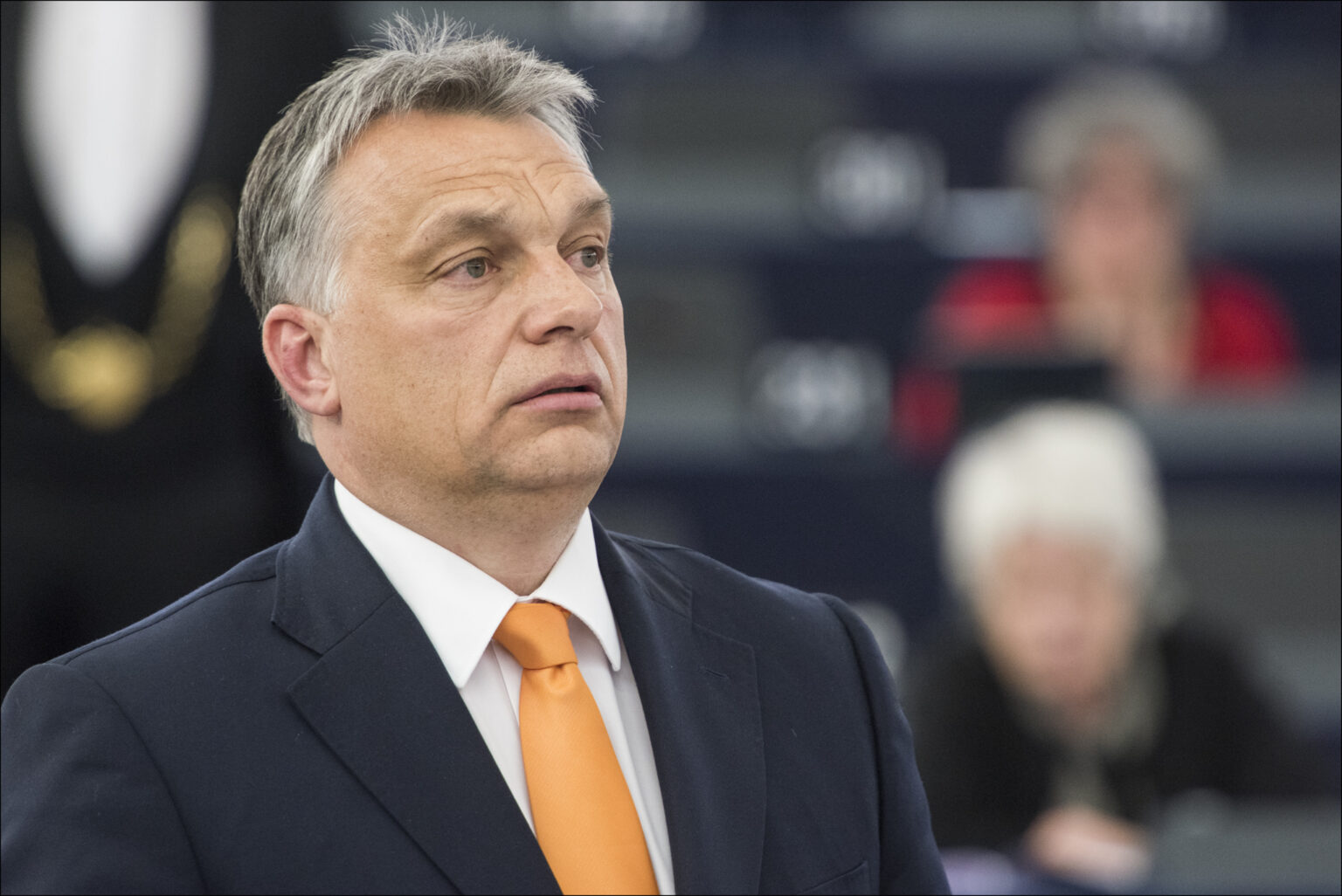
A referendum to be held this coming Sunday during the Hungarian general elections carefully designed to force voters into siding with the current ruling party, Fidesz, against the LGBTI community.
On April 3, the same day as the Hungarian general elections, the ruling Fidesz party will hold a referendum asking the public to validate anti-LGBT legislation that was introduced last year.
The law, banning the “portrayal and the promotion of gender identity different from sex at birth, the change of sex and homosexuality”, was decried by a majority of member states of the European Union, and led the European Commission to take infringement procedures against Hungary.
The referendum, which will be held on the same day as the Hungarian general election will ask four questions:
- Do you support the teaching of sexual orientation to minors in public education institutions without parental consent?
- Do you support the promotion of sex reassignment therapy for underage children?
- Do you support the unrestricted exposure of underage children to sexually explicit media content that may affect their development?
- Do you support the showing of sex-change media content to minors?
However, it is clear from polls and actions of the Hungarian people that state-sponsored anti-LGBTI rhetoric and legislation is not matched by public opinion. Support for LGBTI people in Hungary has never been as high. A record 35,000 people marched at Budapest Pride last July, including many MEPs and other European officials.
According to a representative poll commissioned by Amnesty International Hungary and Háttér Society and conducted by polling agency Medián between 13 and 19 July 2021, 73% of Hungarians reject the government’s false claim that gay and lesbian people abuse or harm children. A clear majority of Hungarian society (74,5%) believe that transgender people should be able to change their gender and name in their official document, while 59% support same-sex marriage.
According to ILGA-Europe’s Advocacy Director, Katrin Hugendubel: “The referendum is in bad faith and specifically timed as part of Prime Minister Viktor Orbán’s continued effort to scapegoat LGBTI people as a method of holding onto power, by distracting from the gross failings and corruption of his government. The questions it poses are carefully designed to force voters into siding with Fidesz against the LGBTI community, thereby giving the false message that the values of the Hungarian people are contrary to the values of the European Union.”
Due to the fact that the referendum coincides with the elections, LGBTI activist organisations in Hungary are not calling for a boycott. Rather they are asking for people to invalidate their referendum vote, since the questions it poses are not in good faith
EU Holds Firm in Face of Hungary’s Blatant Lies Surrounding Anti-LGBTI Law
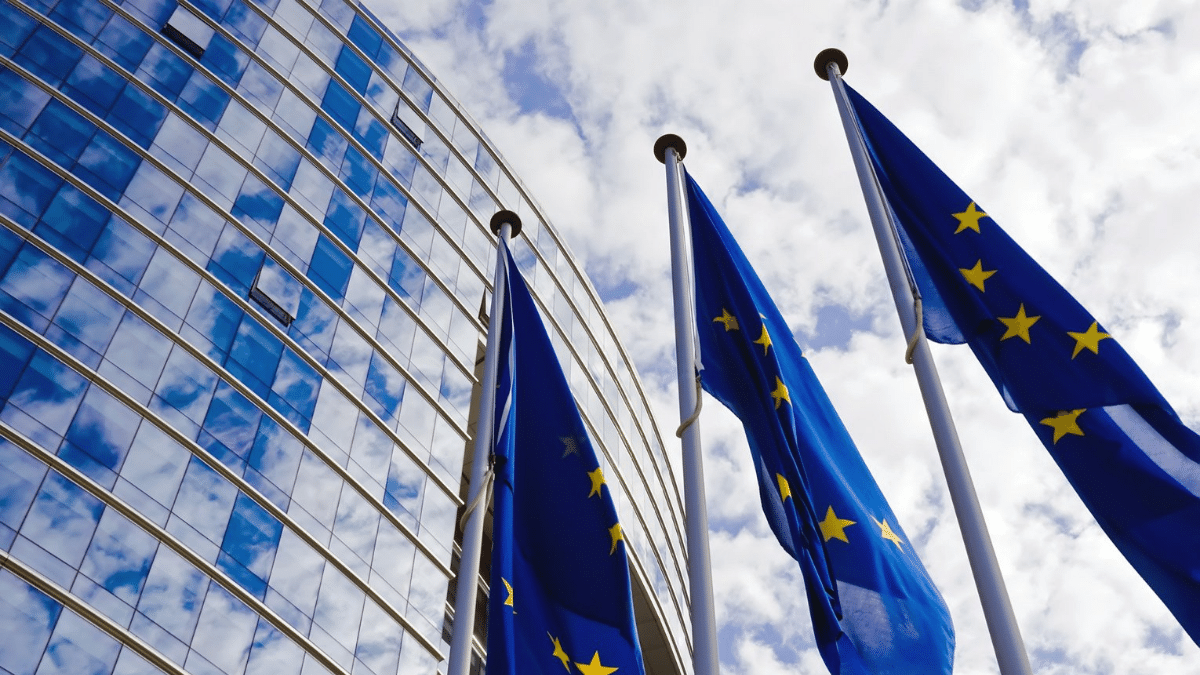
As the European Commission takes the second step in its infringement procedure against Hungary, Europe’s leading LGBTI organisation welcomes its clarified commitment to the equal human rights of the people of Hungary and all other EU member states.
Today, 2 December 2021, the European Commission (EC) began the second phase of its infringement procedure against EU member state, Hungary, due to discriminatory amendments adopted on 23 June in the country, which ban the “portrayal and the promotion of gender identity different from sex at birth, the change of sex and homosexuality”.
On 15 July 2021, the European Commission formally notified Hungary of the beginning of infringement proceedings regarding the amendments. The Hungarian Prime Minister, Viktor Orbán responded by accusing the Commission of “legalised hooliganism” and announcing plans to call a referendum on the amendments, falsely insisting that the infringement procedures specifically seek to interfere in the Hungarian education system. Since then a number of Hungarian government officials have similarly sought to mislead the Hungarian and European public in regard to the content of the infringement procedures.
Today the Commission said that it finds Hungary’s official response to its notification insufficient, and it has therefore started the second phase of the infringement process by sending Hungary a letter known as a “reasoned opinion”, outlining the parts of the new Hungarian law that are breaching EU law, and demanding that these are changed. The EC also identified that even more EU laws are being breached by the amendment, and contrary to claims from the Hungarian government, it did not mention any educational directives in its reasoned opinion.
Instead it clarified that it is specifically concerned with breaches to fundamental EU law when it comes to the freedom to provide services and the free movement of goods. Hungary, the Commission says, has not shown how restrictions in its legislative amendments are duly justified, non-discriminatory, and proportionate.
In addition, the EU clarified breaches of the Audiovisual Media Services Directive and the e-commerce Directive, citing restrictions in the amendments regarding audiovisual media content, including discrimination based on sexual orientation.
The Commission also deems that the Hungarian amendments violate human dignity, freedom of expression and information, the right to respect of private life as well as the right to non-discrimination as enshrined in Articles 1, 7, 11 and 21 of the EU Charter of Fundamental Rights, and due to all of this, the amendments violate Article 2 of the Treaties of the European Union.
According to Katrin Hugendubel, Advocacy Director with Europe’s leading LGBTI organisation, ILGA-Europe: “The Hungarian government keeps twisting the facts and stating that it is protecting children and acting on the will of its people with these amendments. Both statements are patently false. The amendments are an attack on children’s rights as well as the rights of LGBTI people. Contrary to the amendments reflecting the will of the people, support for LGBTI equality is growing in Hungary.
“With these amendments and his referendum, Orbán is running a campaign in advance of elections next year, hoping to distract from the massive problems his government is responsible for by scapegoating the LGBTI community. The EC is right to hold the Hungarian government accountable to the Treaties, and should not hesitate to see this through, including by bringing Hungary in front of the Court of Justice of the European Union (CJEU).”
Hungary now has two months to remedy the breaches identified by the Commission. If they do not amend the law to remove the breaching anti-LGBTI provisions, then the Commission will refer the case to the CJEU.
For further comment, contact: Ana Muñoz Padrós, ILGA-Europe: ana@ilga-europe.org, +32 493 35 60 55
New legal barriers for civil society in Russia
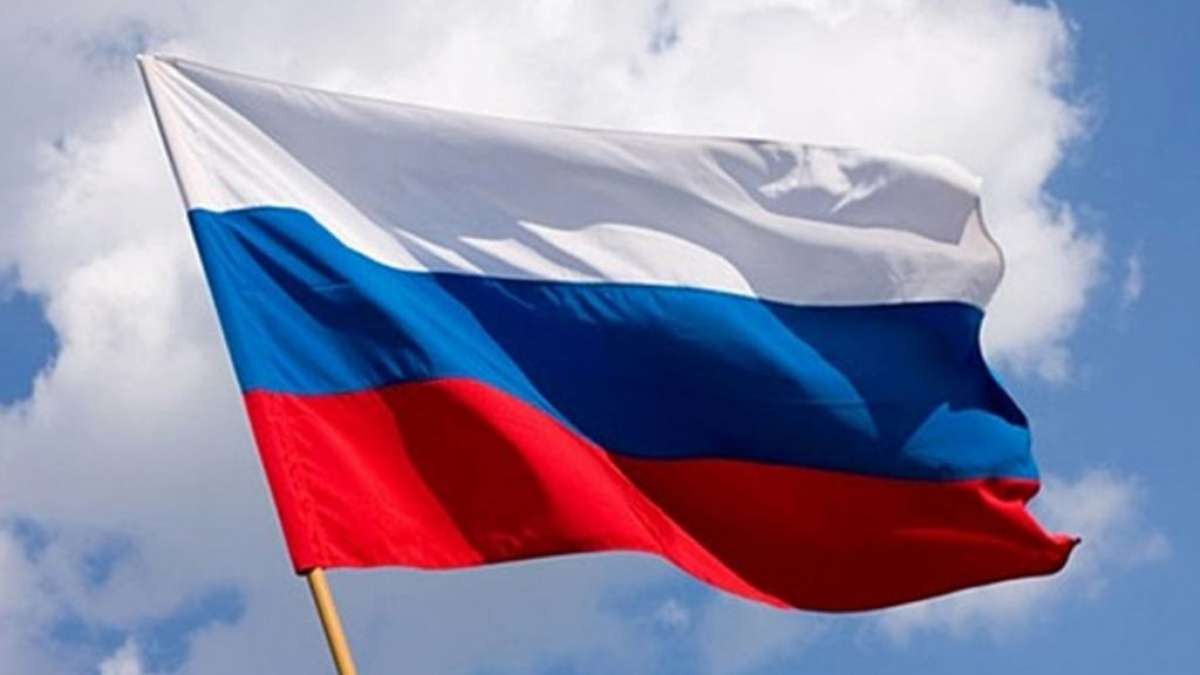
For Russian LGBTI groups, along with the rest of the civil society in the country, 2021 started with the arrival of new barriers to their work.
Law on ‘foreign agents’ extended to individuals and unregistered groups
On 30 December 2020, the amendments to the existing ‘foreign agents’ legislation were signed into law. The ‘foreign agent’ status now applies to anyone receiving funding or other assistance from a foreign entity directly or via Russian organisations or citizens, while having membership in a political party, making “public appeals” for changes in the legislation, engaging in “dissemination of opinions” about officials, carrying out opinion polls “in the interests of a foreign source”. The list of ‘political activities’ also includes “purposeful collection of information in the field of military and military-technical activities” of Russia.
These amendments also extend the ‘foreign agents’ law to apply to unregistered associations that engage in ‘political activities’ and receive funding or other assistance from abroad.
Such individuals and associations are now required to join the registry of ‘foreign agents’ and to report to the Ministry of Justice about their income and expenses, as well as any assets that they receive from abroad. ‘Foreign agents’ cannot become civil servants and cannot have access to state secrets. They are required to label all their communications and publications accordingly, informing the public of their ‘foreign agent’ status.
Criminal liability for those failing to comply with the ‘foreign agents’ law
On 30 December 2020, another amendment to the ‘foreign agents’ was signed into law. It institutes criminal liability for individuals and organisations that were recognized as ‘foreign agents’ but failed to comply with the ‘foreign agents’ law, i.e. those who have previously been found guilty of administrative offences in relation to their ‘foreign agents’ status and have not resolved these violations (e.g. voluntary registration as ‘foreign agents’, labeling communications and publications, or reporting to the Ministry of Justice). Now repeated failure to comply with the ‘foreign agents’ legislation is punishable by up to 5 years in jail.
Restrictions on fundraising for public events
Again on 30 December 2020, two new bills were signed into law and thus amended the current federal laws on public assemblies. Now fundraising and spending for public events are regulated by law. A ban is introduced on the financing of a public event from foreign sources: from foreign states, foreign and international organizations, international movements, foreign citizens (with the exception of permanently residing in Russia), foreign NGOs, minors and anonymous donors, as well as legal entities registered less than one year before the fundraising campaign.
For public events with more than 500 participants fundraising can only be done through a dedicated bank account in a Russian bank. The collected funds can only be used for the public event that was indicated at the time of opening the bank account. Organisers are required to report on the spending after the public event.
Additionally, by a court decision, the term ‘public event’ can cover, inter alia, a series of one-person pickets, individuals taking turns to protest solo, as well as “mass simultaneous presence or movement of citizens in public places, aimed at expressing and forming opinions, making demands on various issues of the country’s political, economic, social and cultural life and foreign policy issues.”
Nikolay Viktorovich BAYEV and two other applicants v. Russia
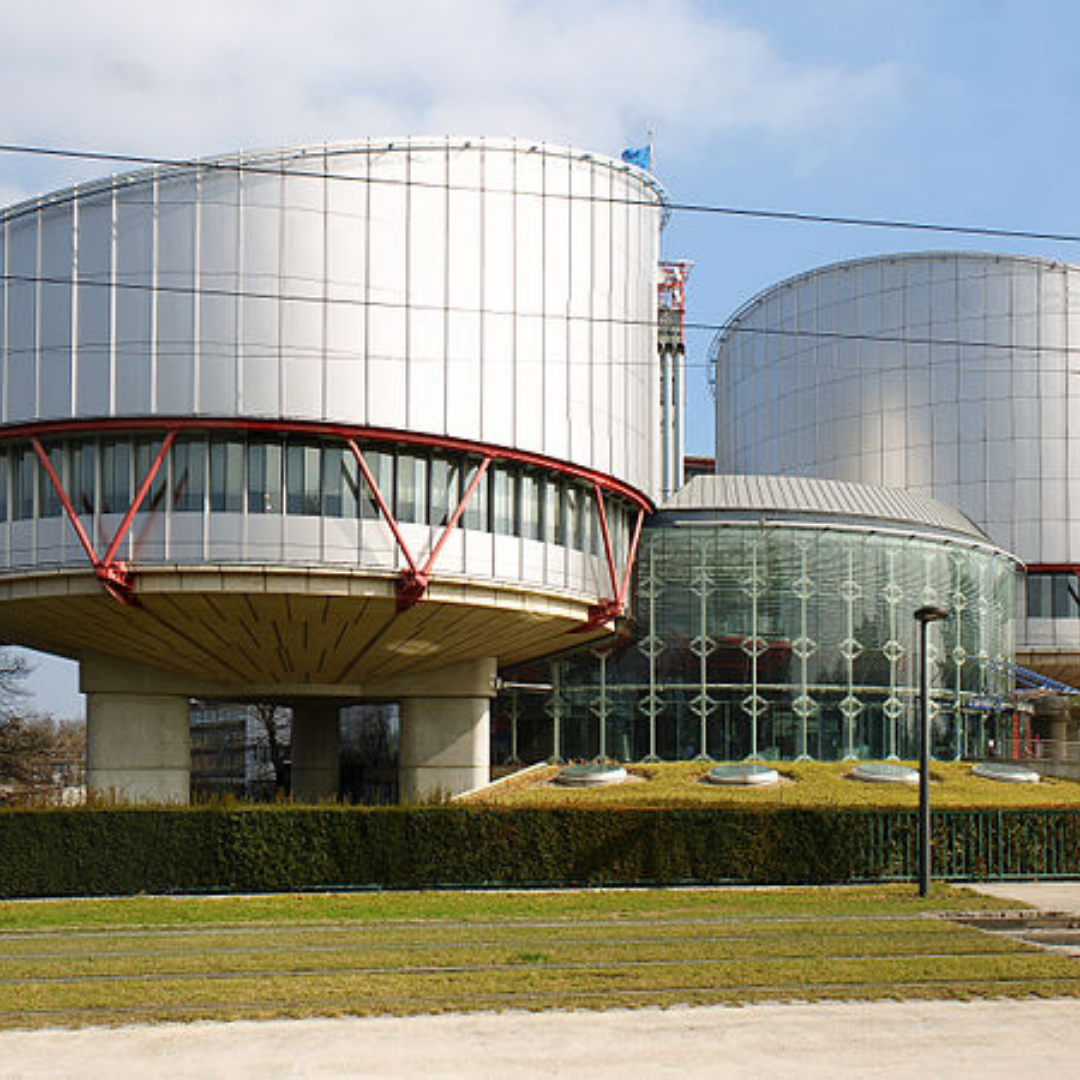
“Anti-propaganda” laws
(Application Nos: 67667/09, 44092/12, 56717/12), February 2014
Find Court’s judgement here. (violation of Articles 10 and 14 of the Convention)
- The present cases arise from the prosecution of three individuals under legislation adopted locally in Russia, prohibiting propaganda of homosexuality among minors and penalising propaganda of bisexuality and transgender identity among minors.
- ILGA-Europe, together with “Coming Out” (the Russian LGBT Network) submitted the following:
- These initiatives have been accompanied by homophobic rhetoric at the highest levels of government, repeatedly stigmatising LGBT people as a danger to children. “Propaganda” laws have been used to restrict freedom of assembly, to prohibit events, to prosecute individuals and to arrest participants in a demonstration.
- European and international bodies have recognised the need to provide relevant, appropriate and objective information about sexual orientation and gender identity, to prevent mental health and sexual health issues.
- The European Court of Human Rights delivered its judgement on 20 June 2017.
- The Court referred to the interveners’ concern about discrimination and violence against LGBT people in Russia, hate crimes, bullying and harassment of LGBT children, pressure on same-sex couples and the children they are raising and on LGBT advocacy organisations (para 60). The Court found that the legal provisions in question did not serve to advance the legitimate aim of the protection of morals, and that they were likely to be counterproductive in achieving the declared legitimate aims of the protection of health and the protection of rights of others.
- Above all, by adopting such laws the authorities reinforce stigma and prejudice and encourage homophobia, which is incompatible with the notions of equality, pluralism and tolerance inherent in a democratic society. Because the legislation also embodies a predisposed bias on the part of the heterosexual majority against the homosexual minority, it gives rise to a violation of Article 14 of the Convention taken in conjunction with Article 10.